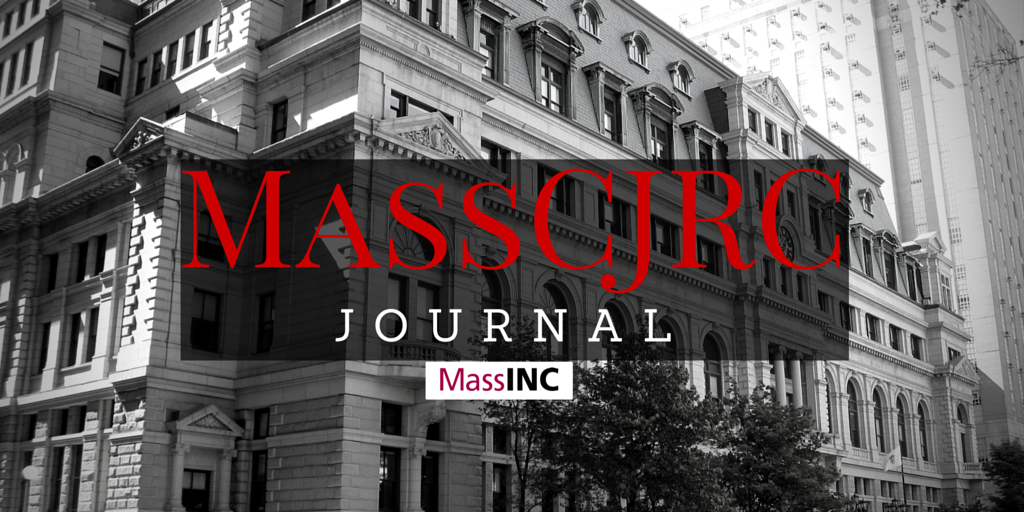Over the summer months, we spent time with grassroots organizations working in neighborhoods disproportionately impacted by incarceration. These groups try their best to support justice-involved individuals and their families, but with very modest resources they only reach a small fraction of those who need services. A key consideration for the Justice  Reinvestment conversation is how do we strengthen community-based organizations that are often best positioned to work with individuals to address their criminogenic risks and needs.
Reinvestment conversation is how do we strengthen community-based organizations that are often best positioned to work with individuals to address their criminogenic risks and needs.
One pathway is Community Corrections Centers. Massachusetts invests more than $20 million annually in a network of centers that span the state providing enhanced probation as an alternative to incarceration. These centers perform risk/needs assessments and develop individually tailored service plans. Some clients receive these services on site; other clients are referred to partner organizations in their neighborhoods.
We visited these centers recently to see how they operate. Watch the video below to hear what we learned from center staff and clients. The biggest takeaway is that many centers are woefully underutilized. This appears like it might be due to judges not seeing Community Corrections as an effective alternative to incarceration. Data provided to us by the Massachusetts Sentencing Commission — which we summarize in a new Justice Reinvestment At-a-Glance fact sheet — show that judges opt to send very few offenders to these centers who might benefit from their services. As the CSG working group begins to look more closely at community supervision, these figures deserve additional unpacking.
-Ben Forman
Federal
The Coalition for Public Safety releases new polling showing strong bipartisan support for criminal justice reform across the country. Over 69% of both Republican and Democratic voters agreeing that the main goal of the criminal justice system should be rehabilitating offenders.
Massachusetts
Governor Baker calls for major change in how mentally-ill inmates are treated, moving them from Bridgewater State Prison to a separate facility, increasing mental health services, and restricting their contact with correctional officers.
The Crime Report looks at the difficulty the Massachusetts court system faces generating trial transcripts and how it effects indigent defendants waiting for an appeal.
Other States
Criminal justice reform initiatives in Connecticut have helped the state see an 8.4% drop in violent crimes in 2015, according to the most recent FBI data as well as its lowest incarceration numbers in two decades.
Mary Fallin, the second term Republican Governor of Oklahoma, pens an op-ed in the Washington Times describing the urgency with which she has worked to modernize the state’s criminal justice system.
Several counties in Florida show positive results by issuing civil citations rather than arresting juveniles, potentially saving millions of dollars in taxpayer money.
From the Researchers
A new study by the Brennan Center for Justice shows that despite reports of a crime wave, overall crime in our 30 largest cities is at an all-time low.
USA Today reports on the skyrocketing number of women in prison and the huge impact on families.
The Journal of Criminal Justice releases a meta-analysis suggesting prison visitation can lower recidivism.
In the Media
The Washington Post looks at the impact of the Dookhan crime lab tampering, noting that nearly two-thirds of the affected cases were simple possession.
Bill Keller writes an obituary for criminal justice reform for the Marshall Project.
Take Part asks five experts how we can get to the heart of criminal justice reform, finding better approaches to reducing recidivism among violent offenders.
Read the latest from our Justice Reinvestment Policy Brief Series
 Harnessing the Power of Data for Justice Reinvestment in Massachusetts
Harnessing the Power of Data for Justice Reinvestment in Massachusetts
Data are increasingly the lifeblood of an effective criminal justice system. Modern technology allows agencies to collect and exchange high-quality, actionable information. These data help frontline workers make informed decisions that reduce risk. And they provide managers and policymakers with vital information for the optimal allocation of resources. Learn More
Mounting an Evidence-Based Criminal Justice Response to Substance Abuse and Drug Offending in Massachusetts
Solutions to better treat and manage substance abuse are paramount to an effective  Justice Reinvestment strategy. Too many residents suffering from substance use disorder continue to enter the criminal justice system, which struggles to help these individuals recover from a life-threatening disease. For many offenders, un- or undertreated substance abuse aggravates anti-social behavior and lengthens criminal careers. The resulting cycle of recidivism creates significant costs for communities and places a significant strain on public resources. Learn More
Justice Reinvestment strategy. Too many residents suffering from substance use disorder continue to enter the criminal justice system, which struggles to help these individuals recover from a life-threatening disease. For many offenders, un- or undertreated substance abuse aggravates anti-social behavior and lengthens criminal careers. The resulting cycle of recidivism creates significant costs for communities and places a significant strain on public resources. Learn More
